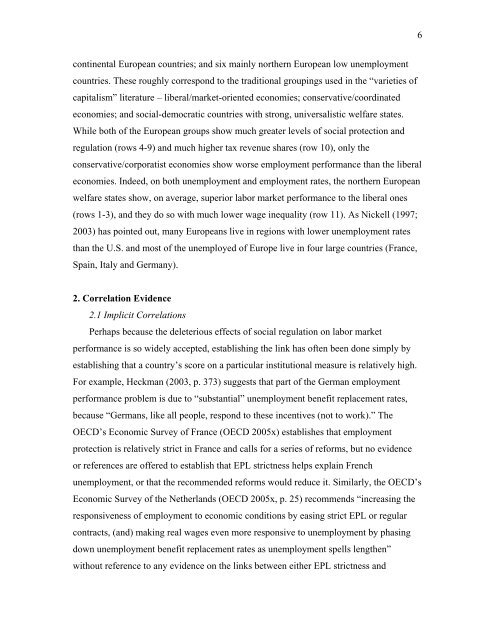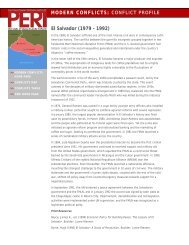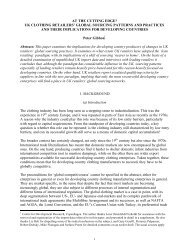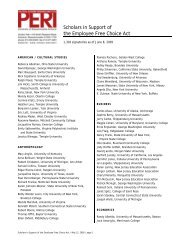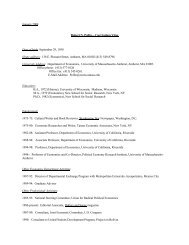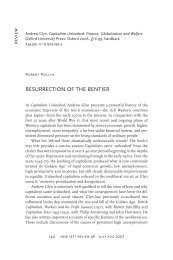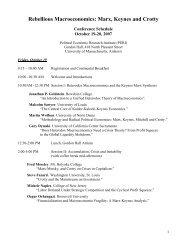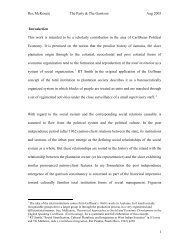Are Labor Market Institutions Really at the Root of Unemployment ...
Are Labor Market Institutions Really at the Root of Unemployment ...
Are Labor Market Institutions Really at the Root of Unemployment ...
You also want an ePaper? Increase the reach of your titles
YUMPU automatically turns print PDFs into web optimized ePapers that Google loves.
6<br />
continental European countries; and six mainly nor<strong>the</strong>rn European low unemployment<br />
countries. These roughly correspond to <strong>the</strong> traditional groupings used in <strong>the</strong> “varieties <strong>of</strong><br />
capitalism” liter<strong>at</strong>ure – liberal/market-oriented economies; conserv<strong>at</strong>ive/coordin<strong>at</strong>ed<br />
economies; and social-democr<strong>at</strong>ic countries with strong, universalistic welfare st<strong>at</strong>es.<br />
While both <strong>of</strong> <strong>the</strong> European groups show much gre<strong>at</strong>er levels <strong>of</strong> social protection and<br />
regul<strong>at</strong>ion (rows 4-9) and much higher tax revenue shares (row 10), only <strong>the</strong><br />
conserv<strong>at</strong>ive/corpor<strong>at</strong>ist economies show worse employment performance than <strong>the</strong> liberal<br />
economies. Indeed, on both unemployment and employment r<strong>at</strong>es, <strong>the</strong> nor<strong>the</strong>rn European<br />
welfare st<strong>at</strong>es show, on average, superior labor market performance to <strong>the</strong> liberal ones<br />
(rows 1-3), and <strong>the</strong>y do so with much lower wage inequality (row 11). As Nickell (1997;<br />
2003) has pointed out, many Europeans live in regions with lower unemployment r<strong>at</strong>es<br />
than <strong>the</strong> U.S. and most <strong>of</strong> <strong>the</strong> unemployed <strong>of</strong> Europe live in four large countries (France,<br />
Spain, Italy and Germany).<br />
2. Correl<strong>at</strong>ion Evidence<br />
2.1 Implicit Correl<strong>at</strong>ions<br />
Perhaps because <strong>the</strong> deleterious effects <strong>of</strong> social regul<strong>at</strong>ion on labor market<br />
performance is so widely accepted, establishing <strong>the</strong> link has <strong>of</strong>ten been done simply by<br />
establishing th<strong>at</strong> a country’s score on a particular institutional measure is rel<strong>at</strong>ively high.<br />
For example, Heckman (2003, p. 373) suggests th<strong>at</strong> part <strong>of</strong> <strong>the</strong> German employment<br />
performance problem is due to “substantial” unemployment benefit replacement r<strong>at</strong>es,<br />
because “Germans, like all people, respond to <strong>the</strong>se incentives (not to work).” The<br />
OECD’s Economic Survey <strong>of</strong> France (OECD 2005x) establishes th<strong>at</strong> employment<br />
protection is rel<strong>at</strong>ively strict in France and calls for a series <strong>of</strong> reforms, but no evidence<br />
or references are <strong>of</strong>fered to establish th<strong>at</strong> EPL strictness helps explain French<br />
unemployment, or th<strong>at</strong> <strong>the</strong> recommended reforms would reduce it. Similarly, <strong>the</strong> OECD’s<br />
Economic Survey <strong>of</strong> <strong>the</strong> Ne<strong>the</strong>rlands (OECD 2005x, p. 25) recommends “increasing <strong>the</strong><br />
responsiveness <strong>of</strong> employment to economic conditions by easing strict EPL or regular<br />
contracts, (and) making real wages even more responsive to unemployment by phasing<br />
down unemployment benefit replacement r<strong>at</strong>es as unemployment spells leng<strong>the</strong>n”<br />
without reference to any evidence on <strong>the</strong> links between ei<strong>the</strong>r EPL strictness and


